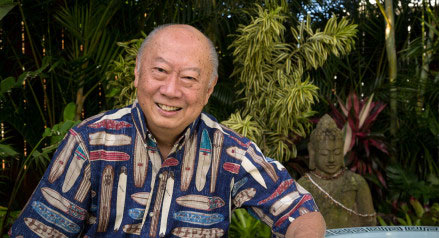|
查看原文
In 2010, The New York Times asked Gallup to dub "The Happiest Man In America" based on its annual Gallup-Healthways Well-Being Index. The answer, as the Times reported at the time: “a tall, Asian-American, observant Jew who is at least 65 and married, has children, lives in Hawaii, runs his own business and has a household income of more than $120,000 a year,” specifically, Alvin Wong.
Today, judging by 2013's well-being results, Hawaii is still one of the country's happiest states, but it recently dropped from the top spot (down to eighth) for the first time in four years.
Given Hawaii's recent slip, we wondered if America's Happiest Man -- now 72 years old and working for a home care agency aiding seniors in his community -- is still just as happy. After all, four years ago, Wong was launched into the public eye and forced to contemplate why his simple, happy life was such an anomaly.
Wong didn't think much about his happiness before being dubbed something of an expert on the topic. "Everybody would ask me the same question," he tells The Huffington Post. "What is the secret to your happiness? And at first it was amusing, but a part of this is really sad. People from all over the world called. 'Give me the secret so that tonight I’m going to be very happy for the rest of my life.' It struck me, first, as funny, but then as sad."
The 5-foot-10 Wong lived, as he still does, in a stuccoed house in the university neighborhood of Manoa with his wife, Trudy, and dog, Samuel Sprocket. His two children are in their 30s; his son lives in Washington, D.C., and his daughter lives in Honolulu.
After being given the label of the country's happiest man, Wong says he felt a certain responsibility to be more introspective about his happiness and good fortune. He considers the title both an honor and a duty, and has pursued a second career in motivational speaking.
"People are looking for a quick fix," Wong says of his many questioners. "But it doesn't happen like that. Like marriage or anything else, you've got to work at it."
Wong says the mantra that kept him happy before the fame still works for him today. "Since being named the happiest man in America, I've done a lot of reading and research on this stuff," he says. "I learned about myself ... And I think, for my own sake, I've come to terms with what is the secret to my happiness. It's attitude."
Wong -- in the way only a happy, self-assured person can -- boils it down to basics. Remembering a convention for people with disabilities, Wong notes that the audience, not the invited speaker, was most inspiring. "They've come to realize," he said about the people he met, "'If I don't have a positive attitude, then I'm going to have a very rotten life.' It's either a rotten life, or try to create a positive attitude. So they work at it."
Working to maintain a positive attitude, Wong says, is the foundation for happiness, especially his. After that, he notes that balance and prioritizing are necessary building blocks.
"If you have a family, your family has to come before anything else," he notes. No matter how many jobs or how menial the labor, Wong stresses that approaching work with a positive attitude will make all the difference. "It should be the most important job to you. It's important because you are working to support your family. It's important because you're keeping yourself busy instead of just wallowing around, saying 'woe is me.'" Working, he notes, can and should be therapeutic.
Wong certainly doesn't show any signs of slowing down. In addition to his motivational speaking, he maintains an herb garden and loves to cook Asian cuisine and barbecue for the neighboring university students (but says his wife does it better).
He says clarity comes the moment you realize that it's OK to not be the smartest or even the happiest person in the world, and when you learn to accept your mistakes.
It's not his unique demographic make-up, he says, that makes him happy. "Every day," he says matter-of-factly, "I [take] one step forward and I'm very happy doing that."
|
查看譯文
2010年《紐約時報》請蓋洛普為基于年度蓋洛普幸福指數(shù)評出的“全美最幸福的人”頒獎。當(dāng)時《紐約時報》是這么描述的“一位高大的亞裔美國人,有孩子,已婚,至少65歲的典型猶太教徒,住在夏威夷,有自己的事業(yè),家庭年收入超過12萬美元。”他就是阿爾文·王。
現(xiàn)在,根據(jù)2013年的幸福結(jié)果,夏威夷依然是這個國家最幸福的城市之一,但是最近它沒能保住榜首之位(掉到了第八位)。這可是四年來的首次。
鑒于近期夏威夷地位的下滑,我們想知道全美最幸福的人——現(xiàn)年72歲卻任然服務(wù)于一家為社區(qū)的老人們提供服務(wù)的機(jī)構(gòu)的人——是否依然幸福。4年前,王進(jìn)入了公眾的視線,人們也開始思考為什么他的簡單并且幸福生活是如此的與眾不同。
在被稱為這方面的專家之前王沒怎么思考過他的幸福之源。“每個人都問我同樣的問題,”他告訴《赫芬頓郵報》。“幸福的秘訣是什么?起初這些問題讓我覺得很好笑,但是現(xiàn)在覺得這真的是一種悲哀。全世界的人都在呼吁‘告訴我幸福的秘訣,這樣我就可以幸福的度過余生。’這讓我很受觸動,心情也由好笑變成了難過。”
身高5' 10"英尺(178cm)的王和妻子特魯?shù)稀⑿」匪_繆爾·斯伯克特依然住在馬諾阿大學(xué)附近的一間灰泥墻房子里。他的兩個孩子都30多歲了,兒子住在華盛頓,女兒住在火奴魯魯。
在被貼上全美最幸福的人的標(biāo)簽后,王說他有一種責(zé)任感,這種責(zé)任感讓他對幸福和好運有了更深入的思考。他認(rèn)為這個頭銜既是一直榮譽(yù),也代表了一種責(zé)任。因此他投身勵志演講作為第二職業(yè)。
“人們都在尋找一種快速療法,”王回答提問者們時說道,“但是這是不可能的,就像婚姻或者其他的事情,你需要用心經(jīng)營。”
王說以前讓他幸福的咒語現(xiàn)在依然有效,“從被稱為全美最幸福的人后我做了很多這方面的閱讀和研究,”他說,“我在了解我自己……我想對我自己來說,讓我幸福的秘密就是態(tài)度。”
快樂、自信的王以他特有的方式發(fā)現(xiàn)了幸福的本質(zhì)。在一場為殘疾人召開的大會上,王注意到最令人啟發(fā)的并非受邀演講嘉賓,而是那些聽眾。他這樣描述那些聽眾——“他們逐漸意識到,'如果我沒有積極的生活態(tài)度,我的生活就會墮落'。要么過一種墮落的生活,要么嘗試積極的態(tài)度。所以他們開始改變。”
王認(rèn)為積極的生活態(tài)度是幸福的基礎(chǔ),對他來說尤為如此。他還注意到,內(nèi)心的平衡與分清輕重緩急是打造幸福基礎(chǔ)的必要基石。
“如果你有家庭,家庭必須重于一切”。無論你的工作有多忙,無論你的工作有多平凡,當(dāng)你以積極地態(tài)度工作時,一切都將不同。保持積極的態(tài)度才是最重要的工作。“你要賺錢養(yǎng)家,你要保持忙碌避免無所事事還整天抱怨‘我是個杯具’。”工作是一件有利與身心的事情。
當(dāng)然,王沒有表現(xiàn)出任何懈怠。除了勵志演講,他還建了個香草園,而且熱衷于為鄰近的大學(xué)生做亞洲菜和烤肉(據(jù)說他的妻子廚藝更好)。
他說,當(dāng)你學(xué)著承認(rèn)你的錯誤時,或當(dāng)你意識到即使成不了世界上最聰明或最幸福的人也沒什么的時候,你會豁然開朗。
并不是他獨特的身份背景讓他變得幸福,“每天,”王承認(rèn),“我都會進(jìn)步一點點,這讓我很快樂。”
(譯者 曳尾 編輯 丹妮)
掃一掃,關(guān)注微博微信
 
|


